Salute Resistance in Honduras
• Demand Obama Break All Ties with Coup Leaders and Act to Ensure Zelaya's Safe Return to Power
• Hondurans on Strike against Coup d’Etat
• President Zelaya to Return to Honduras July 4
• International Delegation Supports Honduran Resistance • Workers Uniting Condemns Military Coup in Honduras
• Nearly 2,000 World Personalities Demand Zelaya’s Reinstatement
• Rio Group Condemns Coup and Demands Unconditional Return to Power of Zelaya
• Coup Government in Honduras Suspends Constitutional Rights
• Honduran Coup Leader SOA Graduate
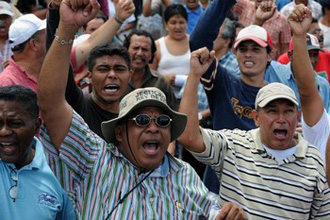
![]()
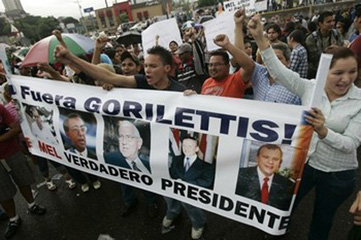
Voice of Revolution salutes the resistance in Honduras to the military coup d’etat against elected president Manual Zelaya. Hondurans across the country are standing up to military and police repression, including attacks on union leaders, farmers teachers and women and youth protesting the coup. The coup organizers suspended constitutional rights, imposed a curfew and brutally attacked the media, including local and foreign television reporters, the local radio station of Jesuits and more. Hondurans across the country are taking their stand for democracy and for their right to participate in writing their constitution.
We call on President Obama to condemn the violence by coup organizers against the resistance. And we urge him to break all ties with the coup organizers now and take action to ensure President Zelaya is restored to power and the coup organizers forced to step down. This could be done by having Secretary of State Hillary Clinton accompany Zelaya on his return to Honduras July 4, or a similarly high ranking official. Obama could readily issue a statement announcing the U.S. is breaking all relations with the coup organizers, including the military forces involved, and demanding their removal. The U.S. military has long organized, trained and dominated the Honduran military. Obama’s National Security Advisor Jim Jones was in contact with the military before, during and after the coup. There is every indication the U.S. will negotiate with the coup forces, given the military leaders were trained at the School of Assassins and longtime U.S.-backed forces. To be consistent with his statements supporting Zelaya's return to power, Obama needs to take action to break these ties and condemn the military's violence against protesters in Honduras.
We demand that Obama end the U.S. double standard concerning violence against dissent. On the situation in Iran, Obama stated, "Peaceful dissent should never be subject to violence." But when it comes to the situation in Honduras, silence in the face of brutal military and police attacks.

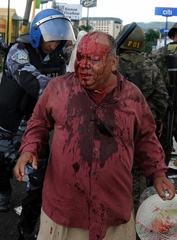

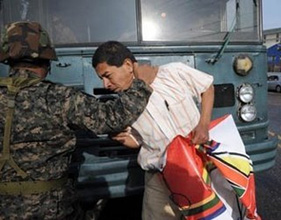
Similarly, when it comes to Israel’s seizing of the humanitarian boat Spirit of Humanity and detaining all 21 people aboard, silence. (See VOR update July 2). When it came to the brutal attacks at the NATO and G-20 Summits in April, silence. When it came to police attacks against protesters at the Republican National Convention, silence. Such double standards make a mockery of democracy, in the U.S. and worldwide and must be rejected by any democratic minded person.
Salute Resistance in Honduras!
[TOP]
Resistance Increases and Broadens
Hondurans on Strike against Coup d’Etat
The Honduras Popular Resistance Front, made up of trade unions and youth, farmers, women and human rights groups, affirmed on Wednesday, July 1 that massive protests rejecting the military coup and demanding President Manuel Zelaya's return are increasing and getting broader. In anticipation of President Zelaya’s return to Honduras July 4, tens of thousands of Hondurans from all regions of the country are marching to Tegucigalpa, the capital to reinforce demonstrations there. Numerous actions are also taking place throughout the country. Various organized forces from among the people are taking over highways and bridges. Signs at the actions denounce the coup and make clear that the people will not submit to the coup organizers, backed by the oligarchy.
Hondurans are denouncing the media blackout taking place in their country, preventing the majority of people from receiving news from independent and international sources. The only media permitted to broadcast or publish since the June 28 coup are those supporting the illegal takeover of the state. Despite the media censorship and the difficulty in telecommunications, the Popular Front is informing people and communicating “with partners from the regions through alternative media in order to coordinate the organized activity.
July 1 marked the third day of a general strike called by the Front, and participants are firm in saying actions will continue until democracy is restored and President Zelaya resumes office. Demonstrations continually took place near the presidential residence where the day before hundreds of police officers with assault rifles and water cannons had attacked a gathering of some 10,000 demonstrators.
The president of the Unitary Federation of Workers and a leader of the Popular Resistance Front, Juan Barahona affirmed the Honduran people's will to continue the struggle until Zelaya and constitutional governance is restored. Barahona and independent presidential candidate Carlos H. Reina said that the people are preparing a warm welcome for Zelaya. They condemned the excessive use of force on the part of the armed forces against the thousands of Honduran citizens.
Trade union leader Porfirio Ponce denounced the reappearance of Death Squad 316 in Honduras, created by the army in the 1980s to assassinate or “disappear” popular leaders. He said that members of that command are harassing popular leaders, like Marcos Antonio Murillo, a trade union leader from the National University of Honduras, whose house was raided in one of the actions of that squad.
On June 30, hundreds of soldiers with rifles were stationed in front of the government headquarters, where thousands of people demanded the return of Zelaya. The police action was rebuffed by demonstrators with stones and sticks and other objects and the number of wounded people and detainees has not yet been confirmed, but appear to be many, the Popular Resistance Front reported. The popular leaders also denounced the detention without due process of numerous supporters and officials of President Zelaya's administration by members of the Honduran military.
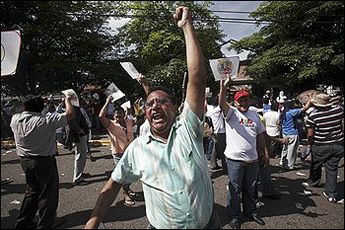
![]()
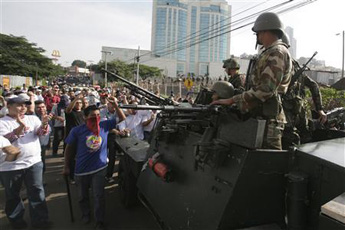
Clashes also took place in other parts of the capital where people opposed to the fascist government set up barricades to withstand the armed forces. Trade union sources report that in Progreso City, close to San Pedro Sula, the country’s second largest city, demonstrators burned and destroyed 6 buses from the Transul Company owned by dictator Roberto Micheletti. In San Pedro Sula, social workers and others held a march in opposition to the coup and to stake their claims on the nation. Rafael Ramirez, one of those present at the march stated, "We have seized the road that leads to Tegucigalpa. Despite this de facto government that keeps us deprived of communication, we are going to a mass demonstration to uphold democracy, a demonstration that started in Santa Barbara [northeast] and will go to Tegucigalpa [southeast]."
According to a report from Telesur, Ramirez explained that "the pro-coup leaders have blocked the roads in this locality in order to prevent protesters from joining this peaceful march." He said, "The military forces, carrying out orders of the de facto government in Honduras, continue repressing the social movements that are in the streets in several areas of the country to demand the return of President Manuel Zelaya," he added.
Candelario Reyes, a retired teacher, said that members of the magistrate, people from nearby areas, farmers and all those who support democracy were participating. He pointed out that in Honduras, the people do not accept coups d'etat, "That is why we are fighting for dignity. We have decided to do everything for democracy because we dream of a country of free people who might have a new Constitution of clear ideas and dreams."
A June 30 report from Press TV quoted Oscar Garcia, vice president of the Honduran water workers union as saying, "We do not recognize this new government imposed by the oligarchy." He added that the resistance campaign will persist until President Zelaya is restored to power: "It will be an indefinite strike," he said. According to a CNN report, Garcia announced that nearly 30,000 public sector workers as well as some private-sector employees and farmers may participate in the strike. Garcia made clear that infrastructure services such as water supply would not be affected by the strike.
On June 29, schools across the country in Honduras were closed as teachers went on a strike to oppose the military coup and voice support for President Zelaya. Many schools remain closed.
The Honduras Popular Resistance Front reports that resistance continues. They have refused to talk with the dictatorial government, which they say is fascist and in violation of the laws of the country.
Coup Organizers Extend Curfew
Granma International reported July 1 that the coup leaders in Honduras have extended a 48 curfew declared by the coup leaders on June 28 until Friday, July 3, according to a communiqué from the secretary for information which also says it will be in place from 9:00 pm to 5:00 am.
In spite of unanimous international denunciation of the coup, the coup-plotters put out an international warrant for the arrest of President Zelaya when he returns to Honduras, leveling 18 charges against him, including betrayal of his country, corruption and abuse of authority. They also began circulating the usual lies of the imperialists that Zelaya is involved in drug trafficking. The coup leaders themselves were trained by the U.S. School of Assassins, well known as an instrument of the U.S. government in organizing and funding the drug trade in the Americas. The peoples of the Americas have not forgotten the U.S. use of drug money to fund wars against Nicaragua, organize the death squads in El Salvador and Honduras and its “war on drugs” against resistance in Colombia, and now Mexico. The effort to smear Zelaya is an effort to divert from the crimes of the coup organizers and U.S. failure to take action to prevent the coup and now bring it to a rapid end.
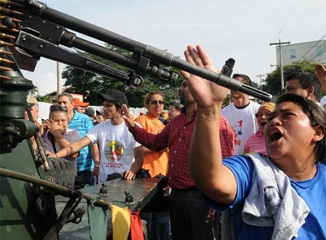
![]()
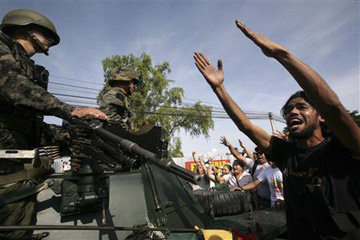

![]()
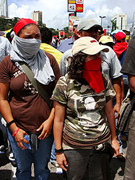
![]()
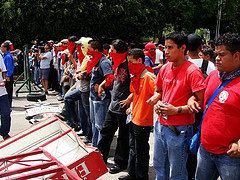
[TOP]
President Zelaya to Return to Honduras July 4
The president of the Republic of Honduras, Jose Manuel Zelaya, removed from office by a coup d'état headed by the military and political elite, reaffirmed that he will return to Honduras on Saturday, July 4. He agreed to postpone his return until after the end of the 72 hours period granted June 30 by the Organization of American States (OAS). “I will return next Saturday, after the end of the period given by the OAS, in order to deal with the responsibilities that my people gave me through the ballot box,” he stressed during an interview with Telesur.
The OAS granted a 72-hour period to the coup organizers to abandon the power they usurped through military forces and restore President Zelaya to power. On his return, Zelaya will be joined by General Secretary of the OAS José Miguel Insulza, Argentine President Cristina Fernandez de Kirchner, Ecuadorean President Rafael Correa and UN General Assembly President Miguel D'Escoto.
Zelaya said it is necessary to return to confront the coup in his country and he thanked the different presidents and officials of the international community for their support, including those planning to accompany him on his return. The Honduran president congratulated the OAS for the resolution adopted on June 30 and he requested that, in case the demands it calls for are not accepted by the coup leaders, that the OAS adopt another, stronger resolution against the de facto government. “I expect that the OAS will denounce with force on Saturday against the de facto government maintained in Honduras by a group of soldiers,” he said. If its initiatives do not bear fruit, the OAS is supposed to immediately apply Article 21 of the Inter-American Democratic Charter and suspend Honduras from that body.
Zelaya also urged the pro coup forces under the orders of Roberto Micheletti to cease the atrocity they are carrying out against the people who are in the streets demanding his return to the presidency to restore constitutional order to Honduras.
[TOP]
International Delegation Supports
Honduran Resistance
Our emergency international delegation to Honduras, organized from the United States by CodePink, Global Exchange and Non-Violence International, took up its fact-finding mission in the wake of the June 28 coup that overthrew President Manuel Zelaya.
We started out with a briefing by the Network of Sustainable Development (Red de Desarrollo Sostenible, a 15-year-old organization devoted to the exchange of information about sustainable development. It has now become a center for exchanging information about the coup. Using blogspot, facebook, twitter, myspace, flickr and youtube, the Network’s network is abuzz with hour-by-hour accounts of political developments. Their communication system has become a critical way for Honduras to get information, since the coup leaders have muzzled the press.
The Network has a history of being objective and is outraged by the coup. “This was just over the top,” said National Coordinator Raquel Isaura, who is being targeted for some anti-coup internet messages posted under her name. “A military coup in this day and age must be condemned by all sectors of civil society.”
Like many Hondurans, Network Director Candalario Reyes Garcia is deeply worried about the future. “In the 80s we were terrorized by the death squads called Batallion 316. These same death squad leaders are still in the military today and if they take control of this country, we’re in for some truly dark days ahead.”
Demonstrations against the coup have been taking place all over the country, but they are not reported in the news and protesters are beaten and tear-gassed by the military. Some movement leaders have been arrested, others are in hiding. The military has also prevented demonstrators from converging on the capital, Tegucigalpa. We met Juan Amilcar Colindres, a professor at the National University of Agriculture in Catacamas. The day after the June 28 coup, he helped organize 8 busloads of people–students, professors, community members–to go protest in front of the Presidential Palace. They were stopped enroute by the military, who insisted that they turn back and ended up shooting at the bus tires to disable the vehicles. “When the soldiers started shooting, people ran into the woods, terrified. The military destroyed 13 tires and we had to pay over $1,500 to repair the buses. Worst of all, we were never able to reach the capital to demand the return of President Zelaya. The same thing has happened to groups all over the country.”
When I asked Colindres why his group supported Zelaya, he said that for the first time in decades, the government of President Zelaya increased the budget for public universities and increased scholarships for the students. “We have a lot of poor students who were helped by this government. We don’t want the elite to take back the government and use it, as they have in the past, to enrich themselves and impoverish the people.”
Our last visit of the day, which went on for hours, was a fascinating gathering with members of the indigenous community, Lencas and Garifanos. This group was lucky to have made it to the capital, where they are camping out in a school auditorium. Entire families, from babies to grandmas, participate in roving protests every day. They keep moving so the military doesn’t know where they will be from one day to the next.
One by one, these humble and poor people told us about their situation, their beliefs, their fears and their dreams. Valentina Dominquez, a primary school teacher, said, “Our people are suffering from poverty, and President Zelaya tried to help. He raised the minimum wage and in the schools, he made sure that all the children were given snacks. He made school registration free and increased programs to help the many Hondurans who do not know how to read or write. That is why we made our way to Tegucigalpa to defend his government and overturn the coup. But we are repressed by the military.” She called for international support.
Teresa Reyes, with the organization of black Hondurans called OFRANEH, said this new regime was terrorizing the people. “On the day of the coup, they cut the electricity, blacked out the news, and told us not to leave our houses. We were scared, we are scared, and we are exhausted — some of us have been walking for days to get here. But even so, we were determined to keep protesting.”
Salvador Zuniga, one of the heads of the Civil Council of Popular and Indigenous Organizations of Honduras (COPINH), talked about the extreme poverty and illiteracy in Honduras, and the desire of poor communities to participate in determining how the nation’s resources are used and distributed. Honduras is notorious for a small group of families controlling most of the resources, from the media to the mines. “With the vote that was supposed to take place on Sunday, President Zelaya simply wanted to ask the people if they liked the idea of rewriting the Constitution, of setting up a new legal framework for determining how decisions get made. The powerful elite in this country was terrified that this process would result in a new economic model at the service of the people, as we have been seeing in other countries of Latin America. That is why they organized the coup, to maintain their stranglehold on the economy.”
Melicio Intibuca, an elderly farmer, was worried that Honduras would revert to the past days of military dictators. “If Zelaya does not return, the repression will get worse. These people do not respect the life of the President, so do you think they will respect the life of us poor people? Already our people have been killed, wounded and are in hiding. We are appealing to you, in the international community. The United States should cut off all aid to this government and demand the return of Zelaya.”
[TOP]
Steelworkers in U.S., Canada and Britain
Workers Uniting Condemns Military Coup
in Honduras
Workers Uniting, the international union comprised of the North American-based United Steelworkers (USW) and British-based Unite the Union (Unite) and representing 3.5 million workers, stands in solidarity with our fellow unions in Honduras — including the Unitary Central of Honduran Workers (CUTH), the Confederation of Honduran Workers (CTH) and the General Workers Central (CGT) — as well as with the Trade Union Confederation of the Americas (TUCA), in condemning the military coup that resulted in the illegal ousting of democratically elected President Manuel Zelaya. Workers Uniting has issued the statement below condemning this coup d'etat.
"This coup represents a huge step backward for this Hemisphere and simply cannot be tolerated," said USW International President Leo W. Gerard. "We call upon the U.S. government to take all peaceful steps, including the withdrawal of all assistance to the military which carried out this coup, to ensure the safe return of President Zelaya to Honduras and to his rightful place as President."
Ken Neumann, the USW Canadian National Director said, "We are shocked by the violent and unlawful seizure of power by the military in Honduras and unite with those around the world calling for the peaceful return of constitutional democracy and civilian rule to that country. This can only be accomplished by the return of President Zelaya without conditions."
"We condemn the violent retribution, including tear gassing and arrests, carried out by the Honduran military against the thousands of people from civil society organizations, including trade unions, who assembled to demand that democratic order be restored and the president returned," stated Unite joint General Secretary Derek Simpson.
Workers Uniting calls upon the United Nations, Organization of American States and the U.S., Canada, Britain and Ireland to take all measures within their diplomatic powers to ensure that all Honduran civilians, and particularly trade unionists and social activists denouncing the coup, are safe and secure and will not be victimized by violence and repression.
"This is a critical moment in the history of Latin America," said Tony Woodley, joint General Secretary of Unite. "We cannot return to a time when military coups were common-place events in the region."
"The only way to ensure that we will not return to this time is for people of good will around the world to stand with the working people of Honduras in calling for a return of President Zelaya to power, and for the Honduran military to respect the human rights of those protesting against the illegal coup," Woodley added.
Workers Uniting Statement Condemning Coup in Honduras
Workers Uniting, representing 3.5 million workers in North America, Britain and Ireland, unequivocally condemns the military coup and kidnapping of the democratically elected President of Honduras, Manuel Zelaya. President Zelaya was working to free his country from decades of hunger and poverty until he was abruptly thwarted in these efforts by the Honduran military.
This military coup is an illegal attempt to use armed force to overturn the course of democracy and social progress chosen by the Honduran people at the polls, and we call upon the nations of the world, and especially the U.S., Britain and Canada, to officially declare the seizure of power by the military in Honduras a "military coup" and to act accordingly. In the case of the U.S., this means withholding all military assistance unless and until President Zelaya is returned to power.
Meanwhile, the military and coup conspirators are trying to suppress popular demonstrations by unions and other social groups by violence and arrests; are illegally shutting down critical news outlets; establishing a blanket military presence and setting illegal curfews. We condemn these acts as well, and call upon the Honduran military to respect the human rights of all, including those demonstrating for a peaceful return to civilian and constitutional rule.
We join the Organization of American States (OAS) and United Nations in condemning the military seizure of power in Honduras as a giant step backward for the Western Hemisphere, an act that simply cannot be tolerated. We therefore call upon our respective governments to take all peaceful, diplomatic measures to ensure the return of President Zelaya to his rightful place as President of Honduras. We further support the efforts of the OAS, UN and other Latin American leaders to accompany President Zelaya back to Honduras on Thursday, July 2, 2009 [now July 4] and call upon others to join them in this effort.
Leo W. Gerard, USW International President
Ken Neumann, USW Canadian National Director
Derek Simpson, Unite the Union Joint General Secretary
Tony Woodley, Unite the Union Joint General Secretary
CONTACTS: Dan Kovalik (US) 412-335-6442
Saba Mozakka (Britain) +44 7768693953
[TOP]
Nearly 2,000 World Personalities Demand
Zelaya’s Reinstatement
More than 1,800 intellectuals, actors, journalists and social activists of Latin America, Europe and the U.S. have signed a message demanding the re-establishment of the constitutional order in Honduras published by a Cuban webpage.
The signatories also denounce the persecution of popular leaders by coup leaders in that Central American country, pointed out the Red de Redes En Defensa de la Humanidad (Networks in Defense of Humanity).
The list of those who have signed the document is headed by Argentinean Nobel Peace laureate Adolfo Perez Esquivel, followed by American actor and social activist Danny Glover; Peruvian poet Arturo Corcuera and Cuban writer Roberto Fernández Retamar, president of the ‘Casa de las Américas’ cultural institution.
Puerto Rican musician Danny Rivera, Chile’s Violeta Parra Foundation and Spanish journalist Pascual Serrano are also on the list. Since the Cuban section of the Networks in Defense of Humanity posted its message denouncing the coup against Honduran constitutional president Manuel Zelaya on Sunday, other groups from Mexico, Argentina and Guatemala have released similar documents.
The messages demand the end of repression against the people protesting on the streets in favor of Zelaya’s reinstatement and they consider all media outlets that are trying to distort the real situation in Honduras accomplices of the coup organizers.
Other signatories of the text are Spanish writer Juan Madrid, Mexican researcher Víctor Flores Olea, and Argentineans Atilio Borón and Miguel Bonasso, among other personalities.
An internet website containing news stories, comments and signatures in favor of constitutional order and respect for the democratically elected President of Honduras, Manuel Zelaya, is available in www.todosconhonduras.cult.cu.
Those interested in joining the demand can do it through the website that also includes updated images of the situation in Honduras and related statements from different personalities taken from the ‘Red de Redes En defensa de la humanidad.’
Cuban News Agency, June 30, 2009
[TOP]
Rio Group Condemns Coup and Demands Unconditional Return to Power of Zelaya
The Rio Group, representing the majority of Latin America, today condemned the coup d’état perpetrated in Honduras and reaffirmed its unconditional backing for the only president of that Central American country, José Manuel Zelaya. The final declaration of the emergency meeting of member countries in Nicaragua refused to recognize the de facto government installed June 28 in Tegucigalpa, Honduras.
The Rio Group members said that the coup executed June 28 in Honduras was an affront to the peoples and democracy of Latin America. They particularly condemned the violence and injustice of Zelaya’s kidnapping, and affirmed that his mandate was the only one that the Rio Group would recognize.
They reiterated their support for the constitutional president of Honduras and demanded his immediate and unconditional reinstatement to the office conferred upon him by his people through their vote. The group noted that the installation of Roberto Micheletti as de facto president lacked legitimacy, and that they would not recognize any official appointed by the imposed government. The declaration’s signatories urged Honduran soldiers to subordinate themselves to Zelaya, the country’s only commander in chief of the armed forces, and demanded that the coup leaders respect human rights and constitutional guarantees.
Moreover, the declaration said it was "indispensable" to guarantee freedom of speech and the physical integrity of journalists in Honduras, several of whom had been arrested for reporting the repression of peaceful civil disobedience protesters.
The Rio Group also agreed to create a delegation of presidential representatives to investigate crimes perpetrated by the coup organizers and called on the Organization of American States (OAS) to adopt drastic solutions to restore democracy in Honduras.
The Rio Group will remain in constant consultation until the only constitutional president of Honduras is unconditionally restored.
Presidents Condemn Coup
Bolivian President Evo Morales stated the need for administrations with diplomatic or other types of relations with Honduras to go into action against the de facto government installed in that country. The president asked how was it coups could be effected in this third millennium and noted that the Southern Command of the U.S. Armed Forces still prevails, teaching the region’s soldiers that social movements are their internal enemies. "I think there are still groups of soldiers in Latin America who believe that the organized peoples are internal enemies and therefore must be abused, and those social movements destroyed," Morales affirmed.
Venezuelan President Hugo Chávez stated that constitutional law must be unconditionally reinstated in Honduras, and called for concrete actions to oust the coup leaders. He warned that allowing the coup leaders to maneuver so as to gain time — for example, until the elections at the end of this year — would make other Latin American governments accomplices to the coup. The Venezuelan president announced that his country is to cut oil supplies to Honduras until the government of José Manuel Zelaya is reinstated.
For his part, the president of the Dominican Republic, Leonel Fernández, affirmed that Honduras has only one president, and that is Manuel Zelaya; the other is a usurper, he said. Mexican President Felipe Calderón highlighted the maturity and responsibility of the leaders present in agreeing, despite their differences, to a common position opposing the coup d’état. Guatemalan President Alvaro Colom called for Zelaya to be restored to his office as soon as possible and thus avoid a bloodbath. Likewise, OAS general secretary José Miguel Insulza condemned the military coup and highlighted the unanimity in recognizing Zelaya as the only legitimate president of Honduras.
The Honduran president, for his part, said that not only was democracy at stake in his country, but also humanity’s conquests with respect to citizens’ participation. He asked: "What is failing in Latin America’s democracies today that such things can happen? Is it people who are failing or the system?” He said, "The fact that we have become independent and formed states and overthrown dictatorships means nothing if brute forces once again prevail over reason." Zelaya affirmed, “In Honduras there is only one president and he is here in Managua. I have six months to go to complete my presidential term; after I have been to Washington I will return to Tegucigalpa and they should expect me. I am going to complete my mandate, whether or not you agree, putschists.”
Representatives of Chile, Peru, Argentina and Colombia also expressed their support for the Zelaya government and agreed that the meeting showed determination in defending democracy on the continent.
[TOP]
Coup Government in Honduras Suspends Constitutional Rights
The following constitutional rights have been suspended by the Honduran Congress under the de facto command of Roberto Micheletti. The suspension is supposed to be valid between the hours of 9pm and 5am but it is likely the police forces will take action at all hours. The coup organizers, through the Congress, has given police and the military the right to hold a person without arrest or allowing contact with the outside world for 24 hours, on a renewable basis —meaning they can be held indefinitely without trial or disclosure.
As a blogger in Honduras points out: “I wrote when all this started on June 28, "Welcome to the 1980's"...well forget that, we are now in the 1970's of dictatorship, Dirty War Argentina. Remember that this usurper Micheletti has illegally seized power by claiming some sort of technical infringement of the constitution on the part of Zelaya. But as soon as he has control he simply suspends six fundamental articles of the very same constitution that pertain to public freedom. This is nothing short of outrageous. This is the direct road to secret police, disappeared people and every other Latin American nightmare of the last century. Do you support what you're about to read “in the name of freedom and democracy?" Shame on anyone with a word to defend this scum. Shame on you,” (Honduras Frente Al Golpe De Estado blog).
The following constitutional articles elaborating on rights of the people have been suspended:
SUSPENDED, Article 71: No person can be detained for more than 24 hours without being presented to the orders of the competent authority for judgment. Judicial inquiry detention cannot exceed six days from the moment of detention.
SUSPENDED, Article 78: Freedom of association and reunion is guaranteed as long as it does not contravene public order and good custom.
SUSPENDED, Article 81: All persons have the right of free passage, to leave enter and stay in national territory. No person can be forced to move from their domicile or residence, except in special circumstances and when the requisites of law allow.
SUSPENDED, Article 84: No person can be arrested or detained without the virtue of a written mandate of the competent authority, expedited with legal formalities and for a motive previously established by law. However, in-fragrant criminals may be apprehended by any person in order to deliver them to authorities. The arrested or detained must be informed in the act and with total clarity of their rights and the reasons for the arrest; also, the authority must communicate their detention to a family member of choice.
SUSPENDED, Article 88: No class of violence or coercion may be exercised on persons to force or make them declare. In a penal, disciplinary or police issue, nobody can be made to declare against t themselves, against a spouse or living companion, or against family members inside fourth grade of bloodline or second of affinity. Only in front of a competent judge make statements be taken. Any declaration obtained by infringement of these dispositions is null and void.
SUSPENDED, Article 99: The domicile cannot be violated. No entry or register can take place without the consent of the person who resides in the domicile or without a resolution from a competent authority. However, the domicile may be searched in the case of emergency to impede the commission or the impunity of a crime or to avoid serious harm to person or property.
Brutal Attacks on Media by Coup Organizers
The Honduran military has shut down radio and television stations since the coup, including Telesur, in a move that has received international condemnation. Private television stations supporting the coup have imposed a blackout, broadcasting cooking shows, cartoons and soap operas despite the protests across the country and international repudiation of the coup.
Coup leaders have violently shut down or taken over most media outlets by breaking down doors, throwing transition equipment on the floor, detaining reporters in military vehicles, and threatening to shoot them if they move, according to independent video recordings circulated by internet. According to Edgardo Castro, a Telesur correspondent in Honduras, "The coup government has obligated the owners of cable companies to cut off Telesur's signal and only permit international signals that support the coup government," such as CNN. (Telesur is a TV channel initiated by the Venezuelan government.)
Military personnel detained several reporters from the crew of Telesur June 29. Telesur had provided detailed coverage of the coup as it unfolded. The crew was filming military repression against demonstrators protesting the coup from the rooftop of a building in Tegucigalpa. Four Associated Press reporters were also detained.
Telesur interrupted live coverage of the emergency meetings of Latin American heads of state in Nicaragua discussing the crisis in Honduras, to broadcast the cries of Adriana Sivori, Telesur correspondent in Tegucigalpa, as she was arrested along with her camera crew by Honduran military forces. The last thing Sivori said before the broadcast was cut was that she was being transferred to an unknown location.
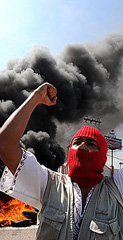 Madelein García, another Telesur correspondent, attempted to interview members of the Honduran military who said that they had taken the reporters to the Hotel Marriott. García also said that the military had contacted Telesur repeatedly throughout the afternoon demanding that they stop transmitting images of what was occurring. After being released, Sivori said, "We were transferred to immigration at gunpoint and they gave us back our passports. We were kidnapped, we were beaten by two members of the army who transferred us at gunpoint."
Madelein García, another Telesur correspondent, attempted to interview members of the Honduran military who said that they had taken the reporters to the Hotel Marriott. García also said that the military had contacted Telesur repeatedly throughout the afternoon demanding that they stop transmitting images of what was occurring. After being released, Sivori said, "We were transferred to immigration at gunpoint and they gave us back our passports. We were kidnapped, we were beaten by two members of the army who transferred us at gunpoint."
The remaining independent media in Honduras have released video recordings of thousands of anti-coup protestors singing songs, chanting for Zelaya's return, and blocking off streets by burning tires and throwing rocks at security forces. Military and riot police have reportedly used rubber bullets, tear gas, and other unidentified chemicals to break up the protests outside the presidential palace, causing at least one death and many injuries. The coup government has continued to arrest pro-Zelaya government officials.
[TOP]
Honduran Coup Leader SOA Graduate
The general who overthrew the democratically elected president of Honduras is a two-time graduate of the U.S. Army School of the Americas, (SOA) an institution that has trained hundreds of coup leaders and human rights abusers in Latin America. [The SOA is commonly known among activists and supporters of democracy through out the Americas as the School of Assassins.]
General Orlando Vásquez Velásquez toppled President Manuel Zelaya in a pre-dawn coup on Sunday, surrounding the presidential palace with more than 200 soldiers and tanks and tear-gassing a crowd outside. The president was abducted and taken to an Air Force base before being flown to Costa Rica. he overthrow followed a showdown over a controversial non-binding hat was to have taken place the day of the coup.
The military moved quickly against media outlets in an attempt to stem the flow of news about the ouster and the protests that followed.
Jesuit Fr. Joe Mulligan provided NCR with a copy of an email he received about the media crackdown from fellow Jesuit, Fr. Ismael Moreno, director of Radio Progreso, the order’s radio station in Honduras. The station was transmitting news about the coup Sunday morning when about 25 military troops stormed the building and ordered them to cancel their programming, the email said. While the soldiers were inside the station, a large group of people gathered outside to support the station’s personnel. The standoff was apparently resolved without violence, but the station had not resumed operations by June 29. Meanwhile, protests were growing in the capital city of Tegucigalpa, and strikes were being planned by Zelaya supporters.
The events came as no shock to Maryknoll Fr. Roy Bourgeois, founder of SOA Watch, which has sought for years to shut down the Army school. The SOA was renamed in 2000 as the Western Hemisphere Institute for Security Cooperation. “We’re not surprised. Vásquez is one of the key players, an SOA graduate” who is keeping alive one of the school’s nicknames, “School of Coups.”
The overthrow is refueling the latest effort by U.S. peace activists to shut the school once and for all. Eric LeCompte, national organizer for SOA Watch, said there are two pieces of legislation that are gaining support. One is Representative Jim McGovern’s House Bill 2567, which calls for suspending operations at the SOA/WHINSEC and investigating the torture manuals and human rights abuses associated with the school. The second is an amendment to the National Defense Authorization Act for FY 2010, which would force the release of the names of the school’s graduates, including their rank, country of origin and the courses they have taken.
While the Defense Department promised transparency when it re-opened SOA as WHINSEC, LeCompte said it has refused to release the names of the instructors and the graduates since 2005 — after it was revealed that the school was enrolling well-known human rights abusers. One — Salvadoran Colonel Francisco del Cid Diaz, a 2003 graduate — was cited by the 1993 United Nations Truth Commission for commanding a unit that dragged people from their homes and shot them at point-blank range. Last week the House approved the amendment, but the measure still has to survive a House and Senate conference committee later this summer.
In overthrowing the government Sunday, Vásquez Velásquez joins two other Honduran SOA graduates who deposed heads of state, General Juan Melgar Castro and General Policarpo Paz Garcia.
Melgar Castro ruled Honduras from 1975 to 1978, the years when two of his SOA underlings — Major Jose Enrique Chinchilla and Lieutenant Benjamin Plata — conducted an operation that tortured and executed two priests, Michael Cypher and Ivan Betancur. The priests’ bodies were thrown in a well along with two women and five peasants who were baked alive in bread ovens. The massacre took place on the Los Horcones hacienda, which was owned by the father of Manuel Zelaya, the Honduran president ousted Sunday.
Melgar was overthrown in 1978 by fellow SOA graduate, Paz Garcia, who the U.S. Army installed into SOA’s “Hall of Fame” ten years later. Paz Garcia’s tenure was also marked by brutal military repression and the formation of Battalion 316, a military death squad that worked closely with the CIA in targeting suspected leftists in the ’80s. Paz Garcia’s military commander was another SOA grad, General Gustavo Alvarez Martinez, who ran 316 and ordered the execution of Fr. James Carney, a U.S. missionary to Honduras.
The three Honduran generals fit into the larger picture of coup leaders trained by the U.S. Army school, which used to boast about how many of the school’s graduates had become heads of their countries.
The boasting, which stopped after the graduates’ undemocratic paths to power became better known, celebrated such figures as:
• Argentine General Leopoldo Galtieri, who seized power in a bloody coup, bringing down another SOA grad, Gen. Roberto Viola, who came to power during Argentina’s Dirty War.
• Guatemalan dictator General Efrain Rios Montt, who seized power in a coup in 1982 and conducted a scorched earth campaign against the Mayan Indians.
• Panamanian dictators General Omar Torrijos, who overthrew a civilian government in a 1968 coup, and General Manuel Noriega, a five-time SOA graduate, who ruled the country and dealt in drugs while on the CIA payroll.
• Ecuadoran dictator General Guillermo Rodriguez, who overthrew the elected civilian government in 1972.
• Bolivian dictators General Hugo Banzer Suarez, who seized power in a violent coup in 1971, and General Guido Vildoso Calderon, who grabbed power in 1982.
• Peruvian strongman General Juan Velasco Alvarado, who in 1968 toppled the elected civilian government.
In ousting the Honduran president Sunday, Vásquez Velásquez had the help of other SOA graduates, General Luis Javier Prince Suazo, the head of the Honduran Air Force. Another two-time SOA grad, retired General Daniel López Carballo, told CNN that the coup was justified because Venezuelan President Hugo Chávez would be running Honduras by proxy if the military had not acted.
Records show that Vásquez Velásquez took a basic combat arms course at SOA in 1976 and another course on small military units in 1984, while Prince Suazo took a 1996 course on joint operations.
President Zelaya — who the Honduran Congress replaced Sunday with Roberto Micheletti — was a businessman when he was elected in 2006. Zelaya surprised many when he started to loosen the strong ties Honduras has had with the United States, which has controlled the country to such a degree that it was once called the U.S.S. Honduras.
Zelaya enjoyed wide support among the poor and union leaders, but increasingly drew the wrath of the powers that be and clashed with foreign oil companies and the U.S. Embassy when he sought to reduce the price of oil for Hondurans. […]
The coup has brought widespread condemnation by world leaders, and the Organization of American States called for Zelaya's reinstatement.
U.N. General Assembly President Miguel D'Escoto Brockmann “categorically” condemned what he called “the criminal action by the army” and asked the U.N. to find a way to restore the president to power.
D'Escoto also called for President Obama to condemn the coup, noting that Obama announced a new policy toward Latin America at the Summit of the Americas in Trinidad last month. But he added, "Many are now asking if this coup is part of this new policy as it is well known that the army in Honduras has a history of total collaboration with the United States."
The U.S. has sent mixed signals about the coup. Secretary of State Hillary Rodham Clinton said the U.S. was not insisting that Zelaya be restored to office. But later, Obama stiffened his stand, calling for his return to power. Still, he stopped short of calling for sanctions or threatening a cut off of U.S. aid to the country.
Linda Cooper and James Hodge are the authors of Disturbing the Peace: The Story of Father Roy Bourgeois and the Movement to Close the School of the Americas. (http://ncronline.org)
